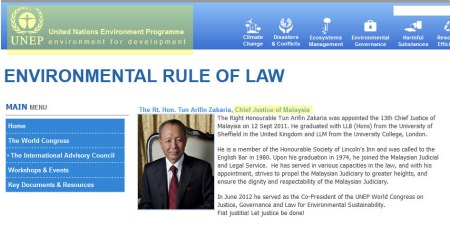Silencing Dissent - The U.N, Courts & the Climate
The Courts & the Climate
http://nofrakkingconsensus.com/2015/10/13/the-courts-the-climate/
What lessons does the environment arm of the United Nations intend to learn from the Chief Justice of Malaysia – whose court has been condemned by Amnesty International?

The Chief Justice of Malaysia is personally responsible for a court that has been condemned by Amnesty International, in a country in which freedom of speech is a fantasy. Such is the calibre of individuals appointed to UN advisory councils. Click for source.
In recent days, other voices have joined the discussion about climate change and the proper role of the courts, including:
- marquee Sunday Telegraph columnist Christopher Booker: “Judges plan to outlaw climate change ‘denial’”
- James Delingpole in The Spectator: “A Supreme Court justice and the scary plan to outlaw climate change”
- climatologist Judith Curry: “Adjudicating the future: silencing climate dissent via the courts”
- Mark Steyn: “Safe-Space Totalitarian Groupthink”
- Andrew Montford: “Justiciable climate?”
- Hilary Ostrov: “Of legal beagles and climate change views”
- Paul Matthews: “Robin Guenier on Philippe Sands”
The latter bulletpoint highlights a thoughtful, 9-page response to a controversial 45-minute speech by law professor Sands. At the top of page five, Guenier cleverly points out that while Sands approves of the fact that minority legal opinions can, over time, become the dominant opinion, he seems intent on preventing this from happening in the climate world: “Surely lawyers would not deny to science something that they welcome for the law?”
Hilary Ostrov, meanwhile, points us to an account of the three-day UK legal conference in which Sands’ speech was delivered, written by participant and law professor Chris Hilson. According to Hilson, Lord Carnwath wasn’t the only Supreme Court justice in attendance. He was joined by Supreme Court judges from France, Belgium, and Brazil.
This is an enormous problem because the primary job of a judge is to be impartial. A judge with an agenda – whether it be climate, abortion, religion, or any other cause – is not, by definition, impartial. The public has a right to know the name of every judge who tosses aside his or her impartiality in favour of activism. But the organizers of this publicly-funded conference insist their identities will remain secret.
I’ve previously mentioned the outrageous fact that sitting UK Supreme Court Justice Lord Carnwath is a member of a United Nations advisory council. Rather than being a disinterested party, the UN is the leading proponent of international climate action. UN climate meetings and UN climate treaties are central to this discussion. Judges who might one day be called upon to rule on climate matters shouldn’t be within 100 miles of a UN body. But there’s Lord Carnwath, swanning around with advisory council colleague Tun Arifin Zakaria, the Chief Justice of Malaysia – who’s personally in charge of a court that has been condemned by Amnesty International.
Which raises another disturbing question: What sort of advice is a man such as Arifin providing to the UN? According to Amnesty, freedom of expression is “subject to severe restrictions under a range of repressive laws” in Malaysia, and media outlets face “sweeping restrictions under the Printing Presses and Publications Act.” This is a nation in which academics, students, and journalists are hounded by the police. In which human rights activists are criminally charged for showing documentary films. In which government critics, including opposition politicians, are persecuted into silence.
In other words this, is a country in which judicial independence appears to be in short supply, and judges appear to be little more than tools of a repressive government. Adding icing to this repugnant layer cake, this is a country in which Chief Justice Arifin delivers stern warnings to the public that “action will be taken” against those who criticize the judiciary.
Why would the UN invite a man such as this to occupy one of nine seats on its International Advisory Council for the Advancement of Justice, Gove...? What lessons, precisely, does the UN intend to learn from him?
.
see also:
"Destroying the New World Order"
THANK YOU FOR SUPPORTING THE SITE!
Latest Activity
- Top News
- ·
- Everything
Ghislaine Maxwell & The Secret "Shadow" 9/11 Commission? | John Kiriakou
When the Communists Take Over America!...Famous 1957 Anti-Communist Movie
When the Communists Take Over America!...Famous 1957 Anti-Communist Movie
Are the End Times Drawing Near?
Catherine Fitts: Epstein, CIA Black Budget, the Control Grid, and the Banks’ Role in War
Ключові слова в тексті: як органічно їх вписати в статтю
Orwell - Football, Beer & Gambling
© 2026 Created by truth.
Powered by
![]()
You need to be a member of 12160 Social Network to add comments!
Join 12160 Social Network